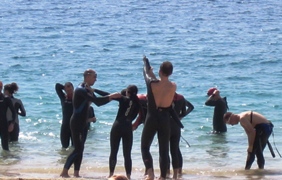Let’s start this post with two quotes:
“You are at the end of season so let’s enjoy ourselves eh !”
“I can’t do it if it makes me feel like that.”
The first quote is the answer I received from my coach in response to asking to enter yet more races for the remainder of the season. The second is from a friend during a discussion of a race that went very wrong after a terrible swim.
My reply to my friend was this: “There’s no point in doing it if it makes you feel bad.”
This sentence summarised what I only very recently had to remind myself of as well. When I started triathlon it was all shiny and new to me. I can remember every bit of the excitement of training, racing, meeting new friends, and sharing my sport with others. It was something I did because it was fun. However, those who read my personal blog on my website will know that I dug myself into a bit of a hole over the last year or so. When I finally noticed, I asked myself what had happened. Why had my favourite pastime become an unhealthy obsession that was slowly destroying my body and my life? How could something that used to be the source of so much pleasure suddenly be a major stress factor? Why was I anxious rather than excited in the days leading up to a race
I c ouldn’t remember when things had changed. However I felt bad enough to understand that I had to find my way back to enjoying triathlon, to make it fun again or to stop.
ouldn’t remember when things had changed. However I felt bad enough to understand that I had to find my way back to enjoying triathlon, to make it fun again or to stop.
Why did things change? There could be several reasons. I’ve always been extremely driven and focussed so to become obsessed with something is not unlike me. In a lot of ways I was stagnating in my training and racing, but didn’t want to acknowledge it because it meant saying goodbye to routine – change can be a scary thing. I had also increasingly withdrawn from joint training sessions fearing that they were not perfectly designed for my progress.
Interestingly I was looking at a bunch of race pictures the other day, and I was shocked how many people looked genuinely unhappy. These were not faces of people in pain because they were trying hard. It wasn’t the look of concentration either. They were people who seemed to think “I don’t really want to be here right now”. There were also pictures of me looking like that. In contrast – have you ever seen Chrissie Wellington not smile for the camera?
Of course not every hard interval session or rainy bike ride done in training is all smiles, but on the whole it needs to be fun! The moment it stops being fun it’s time to analyse and take action! This is easier said than done of course. To overcome what I experienced as stagnation in results, my training had to change. To stop triathlon occupying my mind 24/7, I had to let someone else take over some of the responsibility with regards to my training and racing, and get a coach. I had to ask myself, what could get me some of the excitement back that I used to thrive on – I entered another Ironman. I had to re-immerse myself into the social aspect of being part of a lovely triathlon club. Every race I’ve done since realisation struck I’ve gone into with the simple aim to enjoy myself, the process of racing being the aim rather than the means to a fast time. And I’m in a much happier place now.
Changing habits is never easy, but change is good, and there really is no point in doing this if it’s no fun!
So the next time you are riding past the camera man in the pouring rain, with your feet slowly turning to lumps of ice as the summer once again appears to have retreated to other parts of the world: Give him a smile and count yourself lucky!
Comments are closed.